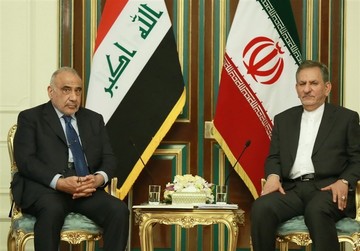“There have been good agreements between Iran and Iraq during past visits by the two countries' officials and the clear message is that Tehran and Baghdad are keen on developing their relations in all sectors despite the US animosity,” Jahangiri said in a meeting with Iraqi Prime Minister Adil Abdul-Mahdi on Sunday.
“There have been good agreements between the two countries in various sectors and fortunately Iran and Iraq have been eager to expand their economic and trade relations,” he added.
Abdul-Mahdi is on a two-day official visit to Iran, one month after a first and historic visit by Iranian President Hassan Rouhani to Iraq. He is leading a large political, military and business delegation in a bid to further consolidate bilateral relations in these crucial sectors.
Rouhani and Abdul-Mahdi oversaw the signing of several agreements and Memoranda of Understanding (MoUs) that lead to the expansion of their mutual relations.
“Should all these accords be implemented, trade and economic ties between Tehran and Baghdad will increase drastically,” Iran's first vice-president said.
President Donald Trump Administration withdrew the US from an international treaty on Iran's nuclear program on May 8, 2018 and restored two-roudn economic sanctions on Tehran.
Rouhani’s first VP stressed that sanctions “not impede development of bilateral ties because although they cause some restrictions, they bring about a lot of opportunities to further develop relations'.
The Iranian official said that Tehran will stand by Baghdad in the reconstruction period as it helped Iraq in combating Daesh terrorists.
The two countries eye a $20 billion annual trade volume that currently stands at 12 billion dollars.
Jahangiri recalled the presence of Iran's construction firms in Iraq before the Daesh terrorist group took over large swathes of land in the neighbouring country and led the country into an all-out war.
'We expect the Iraqi government to address the situation of these firms and have necessary plans for them,' he noted.
The Iranian official mentioned that Iraq’s development and security is the same as its own and expressed hope that 'Iraqi government and nation can take strides in development and success'.
Iraqi PM Abdul-Mahdi said that his government is ready to help Iran assist survivors of the destructive flash floods that have killed dozens of people, injured many others and left hundreds of thousands homeless. “The floods show we haven’t been ready to cope with the scale of such disasters,” the Iraqi official said.
The United Nations Office for the Coordination of Humanitarian Affairs says floods in Iraq have caused some damage in many parts of the country, but no fatalities have been reported.
Abdul-Mahdi expressed that a recent agreement on mutual dredging of the border River Arvand, also known as Shatt al-Arab, could provide the benefits of both countries. The river has not been dredged since 40 years ago since former Iraqi dictator Saddam Hussein tore away the 1975 Algiers Agreement.
He noted that removing fees from visas for Iranians and Iraqis can further promote tourism and expand economic relations between the two countries. Baghdad and Tehran now officially issue visas for Iranians and Iraqis free of charge as of last week.
The Iraqi head of government stressed that Iraq won’t allow other countries to use it as a launching pad for attacking Iran and that his country won’t be part of the US economic sanctions on Tehran.
Abdul-Mahdi was referring to Trump’s comments that had said it will keep its troops in Iraq in a bid to “watch Iran”. Baghdad obtained a waiver from Washington to buy energy from Iran.
“Iraq wants to have the best relations with its neighbours, hence it tries to resolve the problems focusing on common grounds,” he explained.
The Iraqi premier stressed that his government and the Central Bank of Iraq will do whatever they can to pay its debts to Iraq. Baghdad owes Tehran one billion dollar more for purchasing Iranian electricity and gas to feed its energy-starving power plants.

Iran is keen on developing rlations with the neighboring Iraq despite the US animosity, Iran's First Vice President Eshaq Jahangiri said on Saturday.
News ID 190152


Your Comment